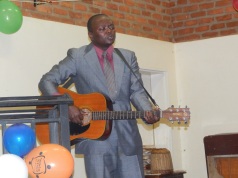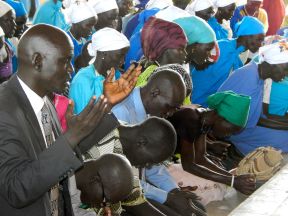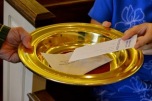Beyond self: Gathered to worshipby Greg Crofford |
 The first line of Rick Warren's The Purpose Driven Life may be its most profound: "It's not about you." Nothing that the church does together underscores this truth more than worship. When the people of God worship together, we are collectively caught-up into the presence of the Eternal One who far surpasses our minuscule, temporal selves.
The first line of Rick Warren's The Purpose Driven Life may be its most profound: "It's not about you." Nothing that the church does together underscores this truth more than worship. When the people of God worship together, we are collectively caught-up into the presence of the Eternal One who far surpasses our minuscule, temporal selves.
Sunday is sacred because - ever since the resurrection of Jesus on that first Easter morning - it has been the one time each week when collectively we set aside all distractions. It is on this day that we celebrate the Risen Christ, focusing on God. The hymn by William Kethe calls us to forget self and directs our attention instead to divine Royalty:
Oh, worship the King, all glorious above,Oh, gratefully sing His pow’r and His love;Our Shield and Defender, the Ancient of Days,Pavilioned in splendor, and girded with praise.
The heart of worship: It's all about God
Note where the focus lies. Each person in the room - be it a small store front with a low ceiling or a sanctuary in a high-vaulted cathedral - directs his or her attention heavenward. Self fades away in the bright light of the God who has no equal. Like the prophet Isaiah, worship properly understood transports us beyond ourselves and takes us to another dimension where we catch a glimpse of the majesty of the King: "Holy, holy, holy is the LORD of heavenly forces! All the earth is filled with God's glory!" (Isaiah 6:3, CEB).
This is the first and most important aspect of worship: It is God-directed. Worship entices us to bow our knee before God, funneling our attention not self-ward but heavenward, celebrating the blessings of God with grateful hearts. And yet as we lose ourselves in God's majesty, something amazing and paradoxical transpires:
Steadfast refusal to focus upon ourselves in the end transforms us!
We see this boomerang effect in Ephesians 3:14-21. Paul offers a prayer, yet it is not a hurried petition, a rote recitation. Rather, it is a prayer that breathes the essence of worship:
"This is why I kneel before the Father." - v. 14 (CEB)
Paul takes on the role of worship leader, submitting as creature to Creator, bringing us collectively into the awesome presence of Almighty God. Importantly, this God is Triune in nature and being. As Paul genuflects before the Father, he asks Him to strengthen our "inner selves" through "the Spirit" (v. 16). He invites Christ himself to live in our hearts "through faith" (v. 17). Oh, the mystery of the Three-in-One God! And not surprisingly, where this Three-in-One God abides, love is never far away:
"I ask that you'll have the power to grasp love's width and length, height and depth, together with all believers. I ask that you'll know the love of Christ that is beyond knowledge so that you will be filled entirely with the fullness of God" (v. 18-19).
If there was any doubt about the corporate setting of Paul's prayer, it evaporates in v. 21: "Glory to him in the church and in Christ Jesus for all generations, forever and always. Amen."
Music as worship
Followers of Christ have inherited from the Hebrew people the Psalter, a magnificent book of Psalms (or songs) written by David and various others. The Psalms set the tone for our praise:
“I was glad when they said to me, ‘Let us go to the house of the LORD’ ” (Psalm 122:1, NASB).
 Paul promoted the use of psalms, hymns, and spiritual songs as a way to “sing and make music from your heart to the Lord” (Eph. 5:19, NIV). Likewise, the Psalmist encouraged worshippers to play a variety of instruments of their day, including the lute, lyre, the ram’s horn and the cymbals (Psalm 150:3-5). By extension, musicians today use contemporary tools to “make a joyful noise to the LORD” (Psalm 98:4, KJV), whether it be keyboards, drums, guitars, trumpets, saxophones, violins, clarinets, or a dozen other instruments. A hundred voice choir, a praise team, a band or the mass of people gathered who join their voices together, all use the musical talent God has liberally sprinkled around. Our responsibility and joy is to discover those talents and give them back to the Lord for God’s glory.
Paul promoted the use of psalms, hymns, and spiritual songs as a way to “sing and make music from your heart to the Lord” (Eph. 5:19, NIV). Likewise, the Psalmist encouraged worshippers to play a variety of instruments of their day, including the lute, lyre, the ram’s horn and the cymbals (Psalm 150:3-5). By extension, musicians today use contemporary tools to “make a joyful noise to the LORD” (Psalm 98:4, KJV), whether it be keyboards, drums, guitars, trumpets, saxophones, violins, clarinets, or a dozen other instruments. A hundred voice choir, a praise team, a band or the mass of people gathered who join their voices together, all use the musical talent God has liberally sprinkled around. Our responsibility and joy is to discover those talents and give them back to the Lord for God’s glory.
Other ways we worship: Scripture, prayer, and response
Besides music, in previous chapters we talked about Eucharist (or the Lord’s Supper), baptism, and preaching. These as important elements of worship, but there is more. Historically, the church has included four times during worship for the out-loud reading of Bible portions by individuals capable of reading the Bible with clarity and feeling. These readings include two Old Testament passages and two New Testament passages. For the Old Testament, this often includes a reading from the Prophets and the Psalms, whereas the New Testament readings are selections from the Gospels and the Epistles. The Revised Common Lectionary is one popular guide book that designates the readings for each Sunday of the year.
Yet worship is not passive. It is participatory. Reciting the Lord’s Prayer or the Apostles’ Creed are common ways that worship leaders elicit the participation of everyone present. There are responses that the congregation voices together, sometimes including snippets of Scripture, sometimes simple formulas that keep the congregation focused. Following the reading of Scripture, the reader often will say: “This is the word of the Lord,” to which the people respond: “Thanks be to God.” At the close of the worship service, pastors or other leaders will invite the congregation to recite “The Grace,” adapted from 2 Corinthians 13:14:
May the grace of our Lord Jesus Christ,
and the love of God,
and the fellowship of the Holy Spirit
be with us all,
now and evermore.
Amen.
Prayer is another way for worshippers to respond. Whether the kneeling bench is directly in front of participants or down in front (an “altar”), the leaders invite those gathered to join in times of prayer. The pastoral prayer in many Christian traditions allows the shepherd a special moment when he or she brings the people before God, praying aloud for their needs, the forgiveness of sins, God’s blessings and protection, even as those kneeling pray softly or silently. Church leaders may anoint with oil those who are sick (James 5:14-15), praying for their healing in the name of Jesus.
Response can go far beyond words to involving our entire body in worship. Many in West Africa cannot stay seated as the tam-tam drums set the cadence for dancing. Joy is written on many a face as worshippers sway to the music, some stepping out into the aisles, inviting others to join them in a train of worship dancers. A jubilant worship chorus in Côte d’Ivoire celebrates the royal dance in 2 Samuel 6:14, urging: “David was a great king, and he got up to dance!” Likewise, churches in the United States will sometimes include a small troupe of worship dancers who through their kinesthetic gifts bring praise to God.
The genius of the people of God gathered to worship is variety. You may not be able to carry a tune and may have two left feet. Still, everyone can give something, even if it’s small. The giving of tithes (10% of income) and offerings (any amount) by those gathered is another way to worship, dropping our monetary gift in the offering plate or (as is common in many African nations) walking or dancing up front to place coins or bills in a basket. In this way, today’s followers of Christ follow a tradition dating to the OT Levites who lived on the gifts of God’s people (Numbers 18:21). In the New Testament, offerings were a way to support pastors (1 Cor. 9:1-11) or provide relief to the poor (2 Cor. 8:1-15). Today, they are used to support a variety of ministries in service to the community.
Conclusion: From celebration to cell group
Worship is the joyous weekly celebration of the Triune God. Likewise, it is the heartfelt corporate thanksgiving of God’s people for heaven’s blessings. More than at any other time during the week, Sunday morning is the visible manifestation of our unity in Christ, a winsome and holy moment that invites one-and-all into the transforming presence of the Holy Spirit. Yet in addition to the large gathering, the New Testament calls the people of God, the Body of Christ to meet in smaller “cell” groups where hurts can be shared and healed, where mutual encouragement can be given as we grow together in Christlikeness. It is to these smaller “sub-flocks” within the larger flock that we turn in the next chapter.
——
Image credit (offering plate): HRBC Richmond


No comments:
Post a Comment